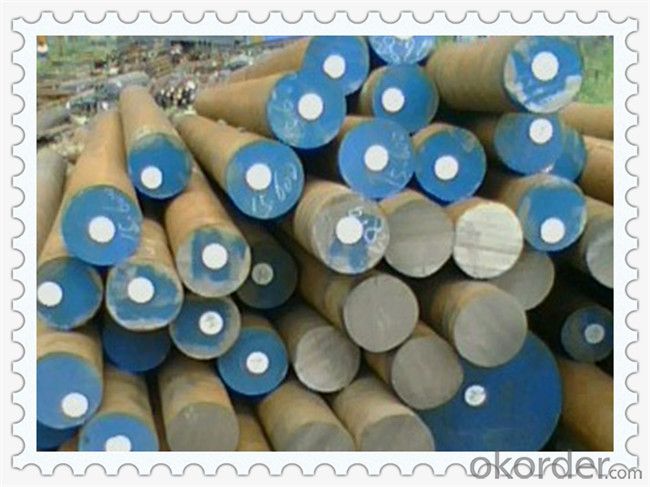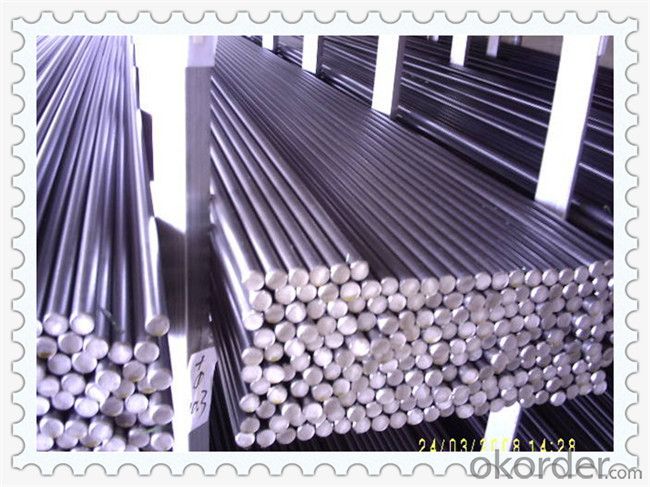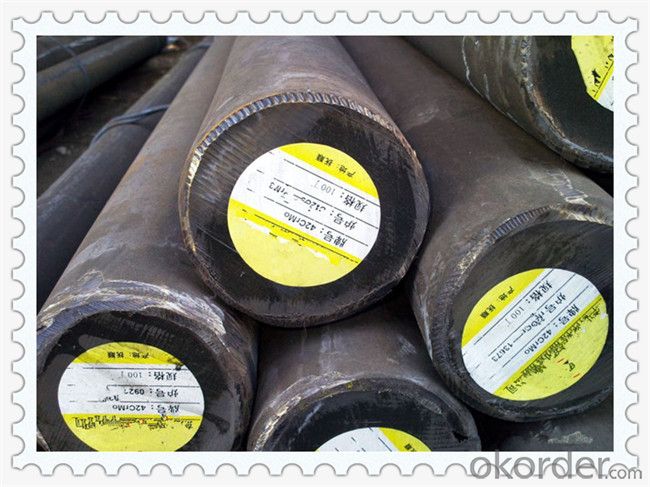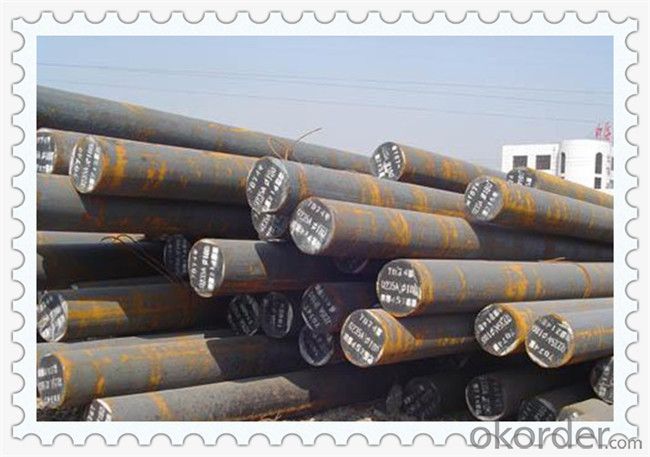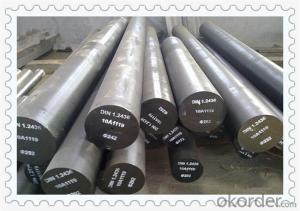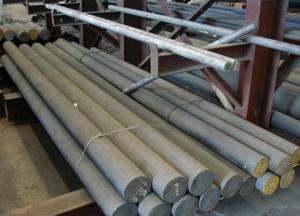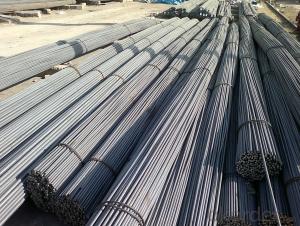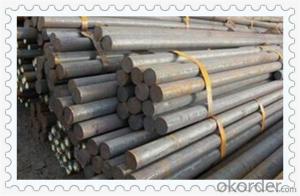C22 Carbon Steel Round Bars
- Loading Port:
- China main port
- Payment Terms:
- TT OR LC
- Min Order Qty:
- 30 m.t.
- Supply Capability:
- 10000 m.t./month
OKorder Service Pledge
OKorder Financial Service
You Might Also Like
C22 Carbon Steel Round Bars
Technical Paramenters
Chemical Composition | Mechanical Properties (In Quenched & Tempered State) | ||
C | 0.37-0.44 % | Tensile strength(MPA) | ≥980(100) |
Si | 0.17-0.37 % | Yield strength (MPA) | ≥785(80) |
Mn | 0.50-0.80 % | Elongation (δ5/%) | ≥9 |
Cr | 0.80-1.10 % | Reduction in Area (ψ/%) | ≥45 |
Ni | ≤0.30 % | Impact (J) | ≥ 47 |
P | ≤0.035 % | Impact toughness value αkv (J/cm2) | ≥59(6) |
S | ≤0.035 % | Hardness | ≤207HB |
Cu | ≤0.030 % | ||
Grade/Material | 1020 1045 4140 4130 4150 ASTM A36 A105 S20C S45c SCM440 |
Available sizes | Round: Dia. 9.5–300mm Square:8*8-160*160mm Flat: Thickness 10–120mm, width 305 – 2200mm |
Size tolerance | Length tolerance:+100mm/-0mm Straigthness:<=3mm/m |
Delivery condition | Hot rolled or cold drawn or forged, turned or black surface, annealed or QT as customer’s request |
Applications | Statically and dynamically stressed components for vehicles, engines and machines. For parts of larger cross-sections, crankshafts, gears. |
Inspection | 100% Ultrasonic according to the test standards: SEP1921-84,GR.3 CLASS C/C |
Packing situation | In bundle or as customer required |
Process | EAF+LF+VD ( necessary) +UT+ Peeled(optional) +Turned (optional) + Heat Treatment (optional) |
Delivery time | 30days after the down payment |
Payment term | T/T or L/C |
Products Show
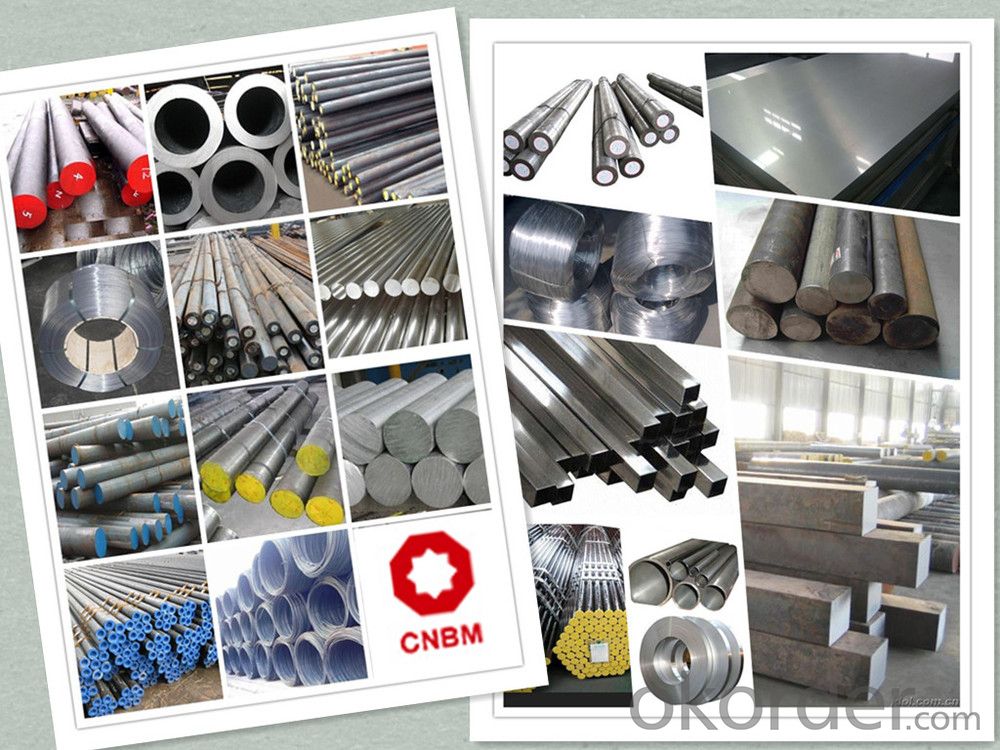
Product Overviews
| Product Name | Typical Grades | Diameter(mm) | Standard adopted |
| Carbon Steel | 20 (1020/S20C/C22) | Ø16-Ø300 |
GB/SAE/JIS/DIN
|
| 40 (1040/S40C/C40) | |||
| 45 (1045/S45C/C45) | |||
| Bearing Steel | GCr9 (51100/SUJ1) | Ø12-Ø250 | |
| GCr15 (52100/SUJ2/100Gr6) | |||
| GCr9SiMn (A485-Gr.1/SUJ3) | |||
Cr-Mo Steel | 20Cr (5120/SCr420H/20Cr4) | Ø12-Ø250 | |
| 40Cr (5140/SCr440/41Cr4) | |||
| 42CrMo(4140/SCM440/42CrMo4) | |||
| Gear Steel | 20CrNiMo | Ø16-Ø600 | |
| 20CrMn(5115/SMnC420/20MnCr5) | |||
| 20CrNiMo(8620/SNCM220/20CrMiMo2) |
Application
| Carbon Steel | Mold bottom, Plastic mold, Construction machinery parts Automobile parts, Security grills, Screens, Construction |
| Bearing Steel | Aerospace, Navigation, Nuclear energy, Chemical industry Electronic information, Petrochemical, Instrument and meter Transportation |
| Cr-Mo Steel | Mechanism & Fasteners gear, Stressed components for vehicles Engines and machines, Parts of larger cross-section |
| Gear Steel | All kinds of gears, Statically and dynamically stressed component for vehicles Engines and machine, Larger cross-section parts, Crankshafts |
Work Shop
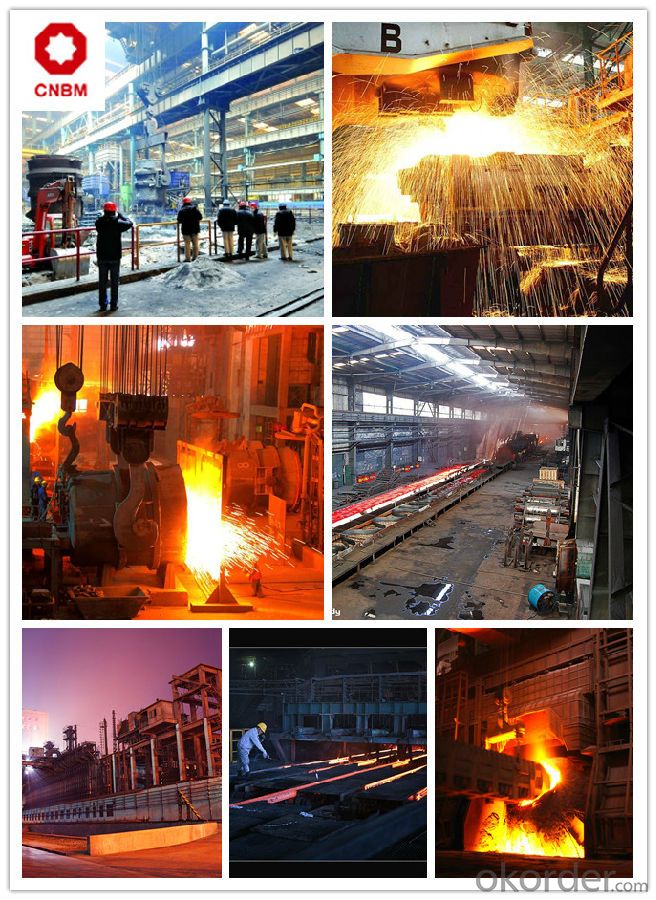
Company Information
CNBM International Corporation is the most important trading platform of CNBM group.
Whith its advantages, CNBM International are mainly concentrate on Cement, Glass, Iron and Steel, Ceramics industries and devotes herself for supplying high qulity series of refractories as well as technical consultancies and logistics solutions.

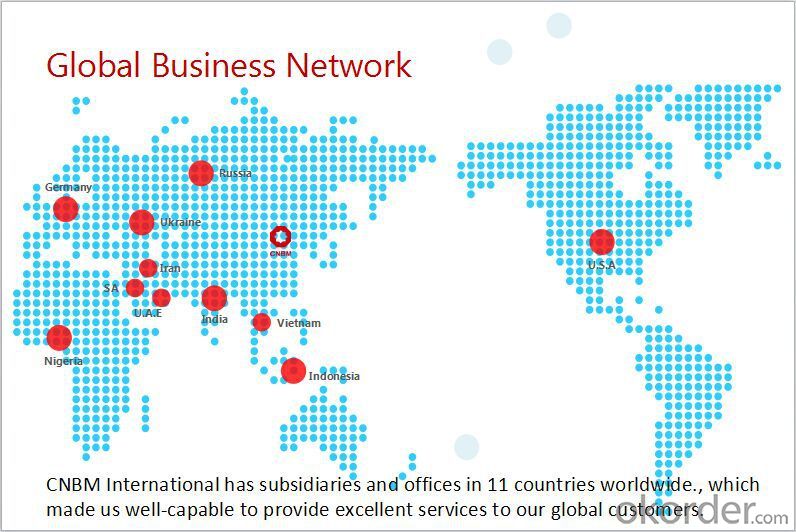
FAQ
1, Your advantages?
professional products inquiry, products knowledge train (for agents), smooth goods delivery, excellent customer solution proposale
2, Test & Certificate?
SGS test is available, customer inspection before shipping is welcome, third party inspection is no problem
3, Factory or Trading Company?
CNBM is a trading company but we have so many protocol factories and CNBM works as a trading department of these factories. Also CNBM is the holding company of many factories.
4, Payment Terms?
30% TT as deposit and 70% before delivery.
Irrevocable L/C at sight.
5, Trading Terms?
EXW, FOB, CIF, FFR, CNF
6, After-sale Service?
CNBM provides the services and support you need for every step of our cooperation. We're the business partner you can trust.
For any problem, please kindly contact us at any your convenient time.
We'll reply you in our first priority within 24 hours.
Packaging & Delivery
1, Packaging: seaworthy package or as required
2, Delivery: 35-45 days or based on quantity
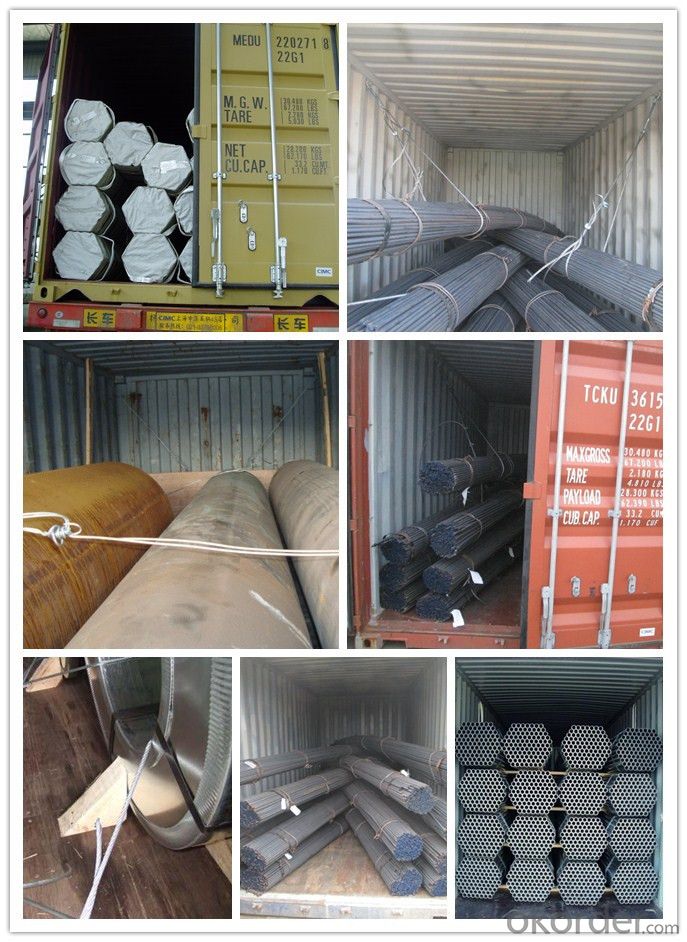
- Q: Can steel round bars be used for making steering components?
- Indeed, it is possible to utilize steel round bars in the production of steering components. The utilization of steel as a material for steering system components is quite prevalent owing to its remarkable strength and resilience. By machining or forging steel round bars, one can fashion them into diverse shapes and sizes to fabricate steering components like steering shafts, tie rods, and drag links. These components necessitate the capability to endure the forces and pressures exerted upon them during steering, and steel's properties render it suitable for this purpose. Moreover, steel is effortlessly obtainable and cost-efficient, rendering it a favored option for the production of steering components in numerous sectors, including automotive and aerospace.
- Q: What are the applications of steel round bars?
- Steel round bars have a wide range of applications across various industries. They are commonly used in construction for structural support, such as in the fabrication of beams, columns, and trusses. Steel round bars are also used in the manufacturing of machinery and equipment, including shafts, axles, gears, and bolts. Moreover, they find utility in the automotive industry for the production of components like suspension systems, chassis, and engine parts. Additionally, steel round bars are employed in the production of tools, such as drill bits, punches, and hammers. Overall, their strength, durability, and versatility make steel round bars an essential material in numerous applications.
- Q: What are the different types of steel round bar surface finishes for improved aesthetics?
- Enhancing the aesthetic appeal of steel round bars can be achieved through various types of surface finishes. The selection of these finishes is typically based on the desired appearance and function of the steel. The following are some commonly used surface finishes for steel round bars: 1. Polished: Achieved through a series of abrasive processes, this finish results in a smooth and reflective surface. It is often utilized in applications that prioritize visual appeal, such as architectural structures or decorative pieces. 2. Brushed: This finish is accomplished by brushing the steel surface with a wire brush or abrasive pad, creating a textured look. It offers a more contemporary and subdued appearance, commonly seen in modern architectural designs or furniture. 3. Satin: Similar to brushed, this finish possesses a finer texture, producing a smooth and matte appearance. It is favored for applications that require a sophisticated and elegant aesthetic, such as luxury fixtures or appliances. 4. Hammered: This finish involves creating small dents or dimples on the steel surface, resulting in a textured and rustic appearance. It is frequently utilized in applications that necessitate a unique and artistic look, such as handrails or decorative accents. 5. Etched: Achieved through chemical treatment of the steel surface, this finish allows for intricate and detailed patterns or designs. It is popular for applications that require personalized or branded elements, such as signage or logos. 6. Powder-coated: This finish entails applying a layer of powdered paint to the steel surface, which is then baked to create a durable and vibrant coating. It offers a wide range of color options and is commonly used in applications that require both decorative and long-lasting finishes, such as outdoor furniture or architectural elements. Ultimately, the choice of steel round bar surface finish depends on the desired aesthetic outcome and the specific requirements of the application. Different finishes can enhance the visual appeal of the steel, making it suitable for a wide range of industries and design purposes.
- Q: Can steel round bars be hardened?
- Yes, steel round bars can be hardened. Hardening is a process in which the steel is heated to a specific temperature and then rapidly cooled, commonly known as quenching. This rapid cooling causes the steel to undergo a transformation, resulting in increased hardness and strength. The hardening process is typically followed by tempering, which involves reheating the hardened steel to a lower temperature to reduce its brittleness and further enhance its toughness. Hardening is commonly used in the manufacturing of tools, machine parts, and other applications where high strength and durability are required.
- Q: What is the machinability of a steel round bar?
- The machinability of a steel round bar refers to how easily it can be shaped, cut, or formed using machining processes such as drilling, milling, or turning. It is influenced by factors such as the composition of the steel, its hardness, and the presence of impurities. Higher machinability indicates that the steel can be machined more efficiently and with less tool wear, while lower machinability may require slower cutting speeds or more frequent tool changes.
- Q: Can steel round bars be used for tooling applications?
- Tooling applications can indeed utilize steel round bars. Steel, being a highly versatile material, possesses exceptional strength, durability, and resistance to wear and tear. By machining, heat treating, and shaping round bars made of steel, one can create a wide range of tools, including punches, dies, drills, and lathe tools. The round shape of these bars facilitates effortless machining and shaping processes. Moreover, the performance of steel round bars in specific tooling applications can be further enhanced through surface treatments or coatings. All in all, due to their outstanding mechanical properties and adaptability, steel round bars find widespread application in tooling.
- Q: Can steel round bars be used for fastener applications?
- Yes, steel round bars can be used for fastener applications. Steel round bars are often used as bolts, screws, and studs in various industries due to their high strength, durability, and resistance to corrosion. They provide a secure and reliable fastening solution for a wide range of applications, including construction, automotive, and machinery.
- Q: What are the different shapes available for steel round bars?
- Steel round bars are available in various shapes to suit different applications. The most common shapes include: 1. Round: This is the most basic and widely used shape for steel round bars. It is cylindrical in shape and has a circular cross-section. Round bars are used in a wide range of industries such as construction, automotive, and manufacturing. 2. Square: Square steel round bars have a square cross-section. They are often used in applications that require added strength and stability, such as structural support columns, fences, and ornamental ironwork. 3. Hexagonal: Hexagonal steel round bars have six sides and a hexagonal cross-section. They offer a good balance of strength and versatility and are commonly used in applications such as machine parts, fasteners, and tooling. 4. Flat: Flat steel round bars have a rectangular cross-section with a narrow width and thick height. They are commonly used in construction and manufacturing for applications such as braces, brackets, and supports. 5. Half-round: Half-round steel round bars have a semi-circular cross-section. They are often used in architectural and decorative applications such as handrails, edging, and trim work. These are some of the most common shapes available for steel round bars. The choice of shape depends on the specific requirements of the application, including strength, stability, and aesthetics.
- Q: Can steel round bars be used in the fabrication of machinery?
- Yes, steel round bars can definitely be used in the fabrication of machinery. Steel round bars are commonly used in the manufacturing industry for various applications, including the fabrication of machinery and equipment. They possess several desirable properties that make them suitable for this purpose. Firstly, steel round bars offer excellent strength and durability. They are known for their high tensile strength, which means they can withstand heavy loads and resist deformation. This strength is crucial in machinery fabrication, as the components of machinery need to be able to endure the stresses and forces that they will be subjected to during operation. Additionally, steel round bars have good machinability, which means they can be easily shaped and formed into the desired components for machinery. This makes them highly versatile and allows for the creation of complex and intricate machine parts. Furthermore, steel round bars have good resistance to corrosion and wear, which is essential in machinery fabrication. Machinery often operates in harsh environments or comes into contact with various substances, such as chemicals, oils, or abrasive materials. The corrosion and wear resistance of steel round bars ensure that the fabricated machinery can withstand these conditions and maintain its performance over time. Lastly, steel round bars are readily available and cost-effective. They can be easily sourced from suppliers and manufacturers, making them a practical and economical choice for machinery fabrication. Overall, steel round bars are a popular and reliable material for the fabrication of machinery. Their strength, machinability, resistance to corrosion and wear, and availability make them an ideal choice for creating durable and high-performing machine components.
- Q: Can steel round bars be used in the manufacturing industry?
- Yes, steel round bars are commonly used in the manufacturing industry for various applications such as machinery, construction, automotive, and aerospace. They are known for their strength, durability, and versatility, making them an ideal material for manufacturing components, tools, and structures.
Send your message to us
C22 Carbon Steel Round Bars
- Loading Port:
- China main port
- Payment Terms:
- TT OR LC
- Min Order Qty:
- 30 m.t.
- Supply Capability:
- 10000 m.t./month
OKorder Service Pledge
OKorder Financial Service
Similar products
Hot products
Hot Searches
Related keywords







